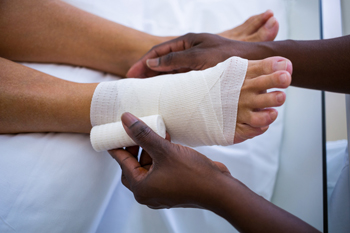
Negative pressure wound therapy, or NPWT, is an advanced treatment that helps heal stubborn wounds on the feet, toes, and ankles. This therapy uses a gentle vacuum to remove excess fluid and improve blood flow, creating an ideal environment for healing. It is commonly used for diabetic foot ulcers, surgical wounds, and other injuries that are slow to heal or at risk of infection. By reducing swelling and encouraging healthy tissue growth, negative pressure wound therapy supports the body’s natural healing process and lowers the risk of complications. A podiatrist can evaluate your wound to determine if negative pressure wound therapy is suitable, and will oversee the treatment to ensure it is applied correctly for the best results. This therapy has proven to be an effective option for people dealing with complex wounds that do not respond to traditional care. If you have foot ulcers or wounds that will not heal, it is suggested that you schedule an appointment with a podiatrist to determine if negative pressure wound therapy is right for you.
Wound care is an important part in dealing with diabetes. If you have diabetes and a foot wound or would like more information about wound care for diabetics, consult with one of our podiatrists from Florida Ankle & Foot Institute. Our doctors will assess your condition and provide you with quality foot and ankle treatment.
What Is Wound Care?
Wound care is the practice of taking proper care of a wound. This can range from the smallest to the largest of wounds. While everyone can benefit from proper wound care, it is much more important for diabetics. Diabetics often suffer from poor blood circulation which causes wounds to heal much slower than they would in a non-diabetic.
What Is the Importance of Wound Care?
While it may not seem apparent with small ulcers on the foot, for diabetics, any size ulcer can become infected. Diabetics often also suffer from neuropathy, or nerve loss. This means they might not even feel when they have an ulcer on their foot. If the wound becomes severely infected, amputation may be necessary. Therefore, it is of the upmost importance to properly care for any and all foot wounds.
How to Care for Wounds
The best way to care for foot wounds is to prevent them. For diabetics, this means daily inspections of the feet for any signs of abnormalities or ulcers. It is also recommended to see a podiatrist several times a year for a foot inspection. If you do have an ulcer, run the wound under water to clear dirt from the wound; then apply antibiotic ointment to the wound and cover with a bandage. Bandages should be changed daily and keeping pressure off the wound is smart. It is advised to see a podiatrist, who can keep an eye on it.
If you have any questions, please feel free to contact our offices located in Tavernier, Marathon, and Key West, FL . We offer the newest diagnostic and treatment technologies for all your foot care needs.



